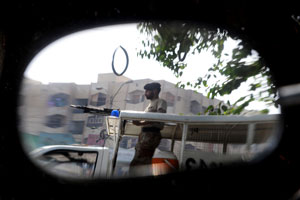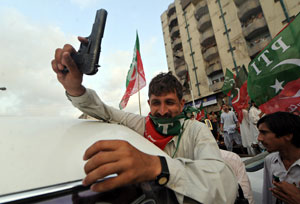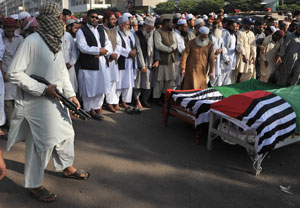The Battle for Karachi
By Amir Zia | News & Politics | Published 15 years ago
It was not just a simple boy-meets-girl love story with a tragic ending. It had a twist. The two lovers were already married — just not to each other. The very fact that they belonged to different ethnic backgrounds and lived in a Karachi neighbourhood where ethnic and political tensions ran high, made their love saga even more complicated. Muhammad Amir, who was in his early 30s and a father of two children, belonged to an Urdu-speaking family, while Zainab was a Baloch whose husband worked in Dubai.
Despite repeated warnings from family and some of Zainab’s neighbours, the two continued their taboo relationship. On January 4, Amir was kidnapped. Two days later, his beheaded body was found in Lyari’s Kalakot area and several hours later the head located in Chakiwara, another part of Lyari.
Amir was an activist of the Muttahida Qaumi Movement (MQM). This association added another grim twist to the tale. A case of an otherwise routine, but controversial, ‘honour’ killing, exploded into a spree of tit-for-tat targeted murders between militants of rival ethnic groups. Stopping this violence proved beyond the powers of the police as these militants were supporters of the two major parties of the ruling coalition — the Pakistan Peoples Party (PPP) and the MQM. Police say that at least 24 people were killed in four days of violence. Tensions ran high not just in parts of Karachi’s District South, but also in some areas of its adjacent District West — highlighting again not just the deep political and ethnic divides in Pakistan’s business and industrial capital, but also underlining the muscle power of the armed groups and the sordid relation between crime and politics.

Photo: AFP
“Criminalisation of politics and politicisation of crime is the biggest problem in Karachi,” says a former IG police, requesting anonymity, who served in Sindh in various important positions for several years. “All the major political parties have criminals in their ranks and they are protected and patronised by politicians.”
The Amir-Zainab love saga indeed sparked the violence, but any other issue could have pit rival bands of militants against each other. The innate germs of political and ethnic rivalry and the clash of economic interests, coupled with rampant poverty and crime, provide the basis for such a showdown.
As the police try to trace the killers of Amir and locate Zainab, their story remains nothing more than a minor footnote in the brewing conflict among different political players and crime syndicates operating in Karachi.
“Crime and politics are so interwoven and the relationship among various stakeholders is so complex that breaking away from the present scheme of things appears impossible for any government,” says the former IG. “Many of those in power have a tainted past and a history of supporting and cultivating criminals and their gangs.”
For many security experts, Karachi, with all its ethnic, political and sectarian problems and crime mafias, is like a bubbling volcano all set to explode. The glimpses of the seething lava were seen as recently as December 28, 2009, when angry bands of youngsters went on a rampage, burning and looting more than 6,000 shops following the bombing of the Muharram procession. Top police officials say it was a “natural reaction” by participants of the mourning procession. (For details see CCPO Karachi’s interview in the box).
In the past, too, Karachi has suffered from widespread violence and terrorism scores of times in which politics, ethnicity, sectarianism and crime played a major role.
As the city was limping back to normalcy following the December 28 incident, a fresh bout of violence erupted among rival political activists. According to police data, more than 75 people were killed in the first 10 days of January alone — mostly political workers belonging to different parties. Many private scores were also settled in the killing spree, forcing the federal government to intervene to help calm the situation.
Top PPP and MQM leaders, nudged by President Asif Ali Zardari and Prime Minister Yousuf Raza Gilani, managed to impose a truce on the streets. But the undercurrents of rivalry and bitterness among the workers and the local leaders of the two groups remain, and are certain to test the unity of the ruling coalition again, in the days to come.

Photo: AFP
Background interviews with leaders of the two parties expose the fragility of peace — especially in District South — the oldest part of Karachi where rival ethnic groups share neighbourhoods and streets.
The MQM sources hold the Peoples Amn Committee of Lyari responsible for triggering the violence. “This Amn Committee comprises gangsters and criminals — members of the notorious Rehman Dakait’s gang,” says an MQM provincial law-maker, who asked not to be named. “And the problem is that the local chapter of the PPP is held hostage to this gang.”
But in the highly polarised world of Karachi politics, one man’s villain is another other man’s hero. And that is the case with Rehman, who was killed by the police in a controversial encounter in August 2009, triggering massive protests by the people of Lyari — the PPP stronghold in Karachi since the early 1970s. For many Lyari residents, Rehman remains a revered figure — a sort of local Robin Hood.
“No one calls him Dakait here,” says Uzair Ali Baloch, who now heads the peace committee. “They will mind if you call him by this name. He is Sardar Abdul Rehman Baloch. He never committed any robbery. The media, the police and the government — all have misguided people about him,” he adds. (Read the story on the Peoples Amn Committee).
The Peoples Amn Committee is not a formal arm of the PPP, but comprises party zealots from Lyari who also remain bitter and angry with many of their elected representatives. This had put the PPP in a dilemma and after the initial reluctance in accepting the group as its own, the Karachi PPP lawmakers have warmed to the committee, which enjoys support on the street as well as muscle power.
“The MQM is responsible for the law and order problem,” says a senior PPP leader, who also requested anonymity. Echoing the sentiment of the Peoples’ Amn Committee, he alleges that the MQM has been trying to change the demography of the area to put a dent in the “PPP fort” of Lyari.
“This tussle is all about MQM’s desire to spread its tentacles to the area where they want to establish a housing society — the amenity land of Gutter Baghicha — and they have already taken over many parks in the adjoining District West where they have settled their own people,” says the PPP leader.
The police say that their hands remain tied because of the political expediency of top government officials.
A crackdown on the criminals of Lyari was halted in the second week of January after PPP’s representative from Karachi in the National Assembly made a hue and cry in parliament. President Zardari himself had to intervene to stop the operation, leaving Interior Minister Rehman Malik red-faced as he was the main target of criticism from his own party members.
According to senior police officials, criminals and militants are not a problem restricted to Lyari alone. “Do you think we can search any of the sector offices of the MQM? We were never given a free hand,” complains one senior police official.
Security officials say that the nexus between politics and crime is an old one in Karachi. Extortionist, kidnappers, drug-peddlers, gun-runners and even petty criminals have managed to find their niche in one political party or the other. All of them are heavily armed and most of them have the connections needed to escape arrest and prosecution.
Other political and religious parties which have heavily-armed bands of militants include the Pakhtun nationalist Awami National Party, the Mohajir Qaumi Movement (Haqiqi), the Jamaat-e-Islami, the Jamiat Ulema-e-Islam, the Sunni Tehreek, and Baloch and Sindhi nationalist groups. All are a source of major headaches for the police.
The influx of both licensed and illegally acquired weapons make the task of the law- enforcement agencies even more difficult in what they describe as one of the most heavily-armed cities of Pakistan.
“When we say weapons it does not just mean pistols or assault rifles…some of these groups have rocket-propelled grenades, rocket launchers and even shoulder-fired missiles,” reports an intelligence official.
However, officially, both the PPP and the MQM deny any links with gangsters or criminals. (See the interviews of MQM leader Farooq Sattar in the magazine and the PPP’s Abdul Qadir Patel online).
Police officials say that the vast squatter settlements and low-income neighbourhoods, especially those which are home to the local and foreign immigrant workers, are the teeming grounds of crime, terrorism and ethnic and sectarian tensions. The neighbourhoods dominated by Urdu-speaking people also have their political, religious and criminal mafias, they add.
But Iqbal Haider, former law minister and a human rights activist, says that criminal gangs also operate with “impunity” in affluent neighbourhoods. “There were dozens of cases of organised gang rapes in Karachi’s Defence and Clifton areas that were brought to our notice. One of the culprits arrested confessed to raping more than 40 women with his aides.”
In one incident, a police mobile van blocked the car of a victim during peak hours on DHA’s 26th street when she was being chased by the kidnappers. “She was kidnapped and raped,” says Haider.
“The hub of the rapists’ activities was a stone throw’s distance from Bilawal House. The perpetuators had criminal and political connections,” Haider maintains. “The building was occupied illegally by politically-connected mafia and some police officials. Police took action against them after the wife of some influential person was raped and we contacted every possible government official concerned with security and law and order. Now, incidents of firing and kidnapping have stopped in that area, which proves that if the authorities want, they can check it.” Haider adds, “No organised crime can exist without administrative support — be it in Lyari or any other part of Pakistan.”
Says a senior police official: one stark example of the involvement of political activists in terrorism and crime can be seen from the fact that more than 100 police officers who took part in the 1990s operations against the MQM were assassinated.
“Such killings stopped after April 2009, after we gave a strict warning to the leaders of that group through powerful government quarters that it won’t be tolerated anymore,” he says. “I told senior government officials that we can no longer take attending the funeral of one officer after another.”
PPP lawmakers also blame militants belonging to their coalition partners for the assassinations of Baloch activists who were campaigning against the utilisation of Gutter Baghicha amenity land for residential purposes. “Even in Lyari, they supported one gang of criminals against the other,” says a PPP leader from Karachi. “Their involvement in crimes can be seen from the fact that MQM workers top the list of the NRO beneficiaries in criminal cases.”
But the MQM strongly denies the charge of its involvement in terrorism or crime and says it has expelled more than 3,500 of its workers to cleanse the party of such elements. (For details see Farooq Sattar’s interview). In 2009, the party says it lost 94 of its workers in targeted killings mostly by criminals in Lyari and militants belonging to the rival Haqiqi faction.
In Lyari and its adjacent areas, MQM workers and supporters were targeted in an organised manner, says an MQM member of the provincial assembly. “We know, and the police knows, that the Peoples Amn Committee, which is in fact the new name of Rehman Dakait’s gang, is behind the killings, violence and crime [in the city]. But the PPP leadership is unable to do anything. In fact, the PPP is now subservient to this gang.”
The MQM claims there is an informal alliance between the peace committee, the ANP and the Haqiqi in an attempt to cut the MQM down to size. “There was even an incident when the beheaded body of one of our workers — Mohammed Mobin Sheikh — was paraded on a donkey cart,” says an MQM MPA.

Photo: AFP
But MQM’s anger is not just directed against Lyari. “The criminals and terrorists have safe havens in other parts of the city as well. Some Haqiqi terrorists operate from the Sherpao area — a Pakhtun-dominated neighbourhood — adjacent to Landhi. If they are ever chased in their hideouts, it could lead to ethnic violence,” says the MQM MPA. “When we ask the police to take action, they refuse, fearing collateral damage.” Citing another example, he says the two slain attackers of the Sindhi nationalist leader Basheer Qureshi belonged to the Haqiqi faction and carried the passes of an intelligence agency.
But apart from the allegations and counter allegations by the main political players, the fact remains that each side has skeletons in their closets. Lyari, where hundreds of people were killed in the infamous war between the rival gangs of Rehman Dakait and Arshad Pappu, is a symbol of that tussle, but the overlapping of crime and politics is a rampant phenomenon in the entire city.
From cases of kidnapping for ransom — in which not just Taliban militants are involved but also some key leaders of the Sindhi nationalist parties — to the subtly-run extortion racket, criminals have links with activists of one party or the other.
Security officials say it is easy for both criminals and terrorists to remain anonymous in a megalopolis like Karachi. The indifference of city life provides a perfect shelter of anonymity to everyone. The corruption and connivance of the police and the politics of patronage helps the criminal-political mafias to sustain, grow and expand.
“Karachi is like a gold-laying goose,” says a retired police officer. “Every political party likes to get its share of the booty according to its power and strength.”
The problem is magnified with key political players vying to control the city, which provides billions of rupees in donations and through the patronage of legal and illegal businesses. The simple rule of gaining power and influence in the city is that there are no rules of the game. Top PPP and MQM leaders may want to keep their alliance intact to remain in power as well as to provide a semblance of peace and rule of law in the city, but breaking the nexus of crime and politics does not seem to be on their agenda. The citizens of Karachi seem destined to live dangerously from one cycle of killings and violence to another. Powerful mafias of criminals, interests groups and bands of terrorists all have the potential and power to ignite city-wide violence at will. And in these testing times, the law-enforcement agencies continue to be found wanting.
Related articles:
Amir Zia is a senior Pakistani journalist, currently working as the Chief Editor of HUM News. He has worked for leading media organisations, including Reuters, AP, Gulf News, The News, Samaa TV and Newsline.


